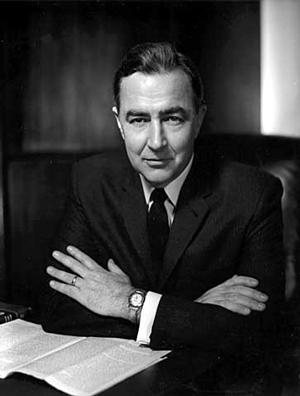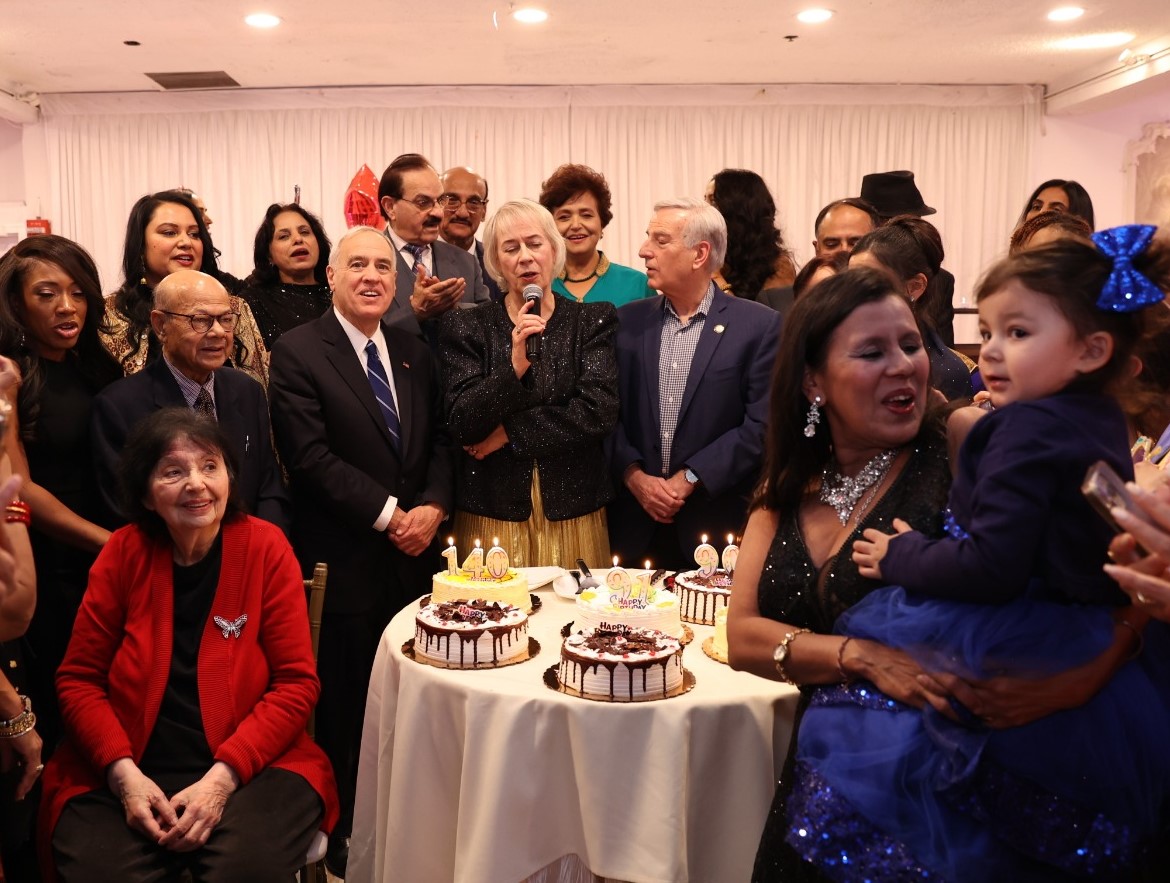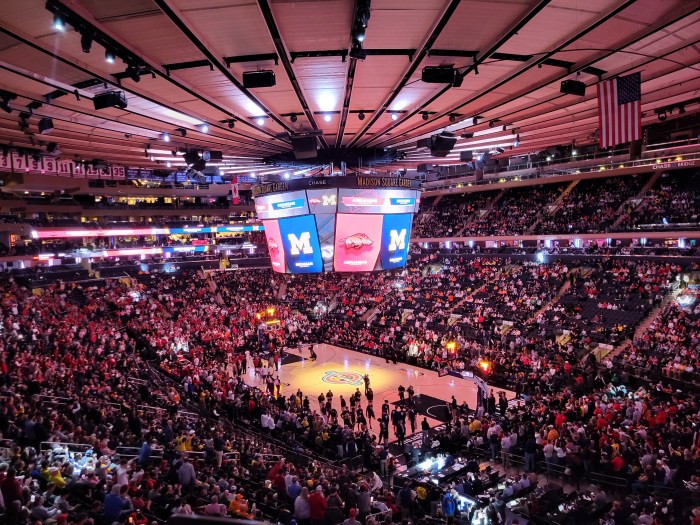
BY JERRY TALLMER | By their hands ye shall know them, and I was at my desk in the City Room of the New York Post, typing away, when I became aware of a tall presence looming just to my left, and then of the large sweaty limp hand that grabbed my own hand off the keys and squeezed it.
“Hi, ah’m Lyndon Johnson,” said the tall presence, and then passed on to the next desk, the next hand. Lyndon Baines Johnson, the troubled vice president of the United States, had come into the old building on West Street to pay obeisance to Dorothy Schiff — they all did, all the candidates or potential candidates, nothing unusual in that. This was around 1961. Nobody — loosely speaking — had ever heard of Gene McCarthy.
Jump seven years. The whole world now knows about Gene McCarthy, and I have been assigned to cover him along the campaign trail wherever he goes.
McCarthy has, among other attributes, a pair of big strong plainspoken hands, a farmer’s hands, though so far as I know, he has never worked on a farm or on an assembly line or in a garage or any of that.
Now, in the bleak New Hampshire sunlight, his large right hand comes down over my hand and pen and notepad in which I’ve jotted down the key words of something outrageous he has just said about Lyndon Johnson: “I thought when presidents got in trouble, they went to blacks for help, not Jews.” Blacks, I wonder, like maybe Supreme Court Justice Thurgood Marshall?
“Please don’t write or print that,” says Gene McCarthy, lifting his hand off my notebook, himself a candidate for president on the stop-the-war ticket — and I don’t write it or print it and don’t resent not writing it in all the 46 years then till now.
The neatly dressed Clean for Gene kids are all over the state, all over the United States, knocking politely on doors, waiting to speak when spoken to. “Good morning, Ma’am, may we come in? Yes, a cup of coffee would be nice right now.”
On the sidewalks of Manchester, New Hampshire, I get talking with a kid from California — an ultra-radical white kid, slim, tall, nice-looking — who’s in a rage, eyes full of tears, because his candidate, Gene McCarthy, won’t pander to the publicity-seeking organizers of a big outdoor rock-and-rally the next evening.
“If this [McCarthy campaign] fails,” the California boy is saying grimly, “I’m off to join Huey Newton in the hills.”
Cool it, I tell him. You know that McCarthy won’t do any crap like that thing tomorrow.
“Yes,” says the weeping, smiling kid, “isn’t he beautiful?”
Eugene Joseph McCarthy (1916-2005), whose upset showing in the New Hampshire primary will soon lead L.B.J. to withdraw shockingly from the race altogether. So, for the McCarthy team, it’s off to New York and then Chicago, and may the best survivor win.
En route, I find myself in a crowded motel room in, I think, New Jersey. There are two big guys sitting side by side on a daybed, passing a baseball bat back and forth between them, fist over fist over fist, as if choosing up sides. The two big guys are Gene McCarthy, whose large strong hands I’ve already noted in New Hampshire, and his campaign pal, elite Boston’s poet-playwright Robert Lowell, winner of two Pulitzer Prizes and much else.
I don’t know if they ever played that ballgame, or who won, who lost, but I do know that, rather than baseball, McCarthy likes to talk dryly about his youthful football days, when you tried in desperation “to gain a few yards through the Forward Fumble.”
I’ve already driven over half of Minnesota on the McCarthy trail, past countless fishing tents atop frozen lakes, and now I’m closing in on one of his alma maters.
“Look,” says the head of St. John’s College as a young man and woman in ordinary clothes run past us, laughing, across the campus. “That’s a priest and a nun.”
I’m back in Washington, listening to this one and that one on the subject of what makes Gene McCarthy tick. Across a lunch table, a Democratic Party hostess and insider named Katie Loucheim is saying: “Minnesota, that strange state. Too much talent. Hubert Humphrey. Walter Mondale. Gene McCarthy.”
Her candidate is Humphrey, of course. She guesses, correctly and sadly, that I too want to stay clean for Gene.
I’ve managed to land a few minutes interview with Robert Kennedy, the attorney general of the United States, not one of my favorite people. He has refused to do what Gene McCarthy is now doing, go one-on-one against L.B.J. No guts.
I’m shown into the attorney general’s place of work, a spacious room, at the far end of which, by the windows, sits R.F.K. himself, on the telephone, looking frazzled and exhausted. He nods for me to take a seat.
“No,” he is saying into the phone. “No, I’m sorry, but I just can’t. No way. Tomorrow is Saturday, the only day I can be with my children. So I’m sorry, but I cannot be there with you. Sorry.”
He hangs up.
And I?
I suddenly feel so sorry for him that I cannot ask the question I’ve come all the way to Washington to ask him: When if ever are you going to get off the dime, and run?
I can’t ask it.
J.T. … no guts.
The day after L.B.J.’s withdrawal, we get the answer: Now Robert Kennedy is entering the race to the White House.
Only now. Which does not endear him more to me.
Chicago — well, Chicago 1968 was something else, with tear gas and stink bombs everywhere, and Mayor Daley’s cops running wild in pursuit of Abbie Hoffman & Co. through Grant Park and up and down Michigan Avenue. Some thugs unknown invade the McCarthy campaign headquarters on a high floor of the Hilton to beat up all the Clean for Gene kids in sight, and the splendid Murray Kempton of the New York Post leads a candlelight procession through the streets of Chicago, in protest.
The day after the day after, I’m having breakfast at a coffee shop downstairs in that same Hilton, the perfume of stink bombs still in the air. Across the table is — guess who — Mr. Yogi Berra, then a coach of the New York Mets. He stares at me, I stare at him, but I don’t have to verify what everybody knows. Yogi Berra has good hands. And clean hands.



































